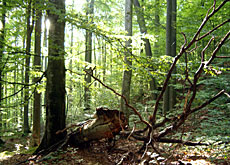hospitality helps save ukraine’s forests

Sustainable woodland management and disaster prevention are the goals of two Swiss projects in the mountains of western Ukraine.
In the rural villages of Transcarpathia, over-dependence on forest products is threatening the stability of the ecosystem. The local people are trying an alternative: eco-tourism.
The region around Chernobyl is not the only part of Ukraine closed to the general public.
In the mountains of Transcarpathia, close to the border with Hungary and Romania, another area has been declared “out of bounds”. But in this case the purpose is not to protect humans from a treacherous environment, but the natural world from human activity.
The location is Uholka, in the Carpathian Biosphere Reserve (9,000 hectares in area), in one of Europe’s last remaining virgin forests. It was in this fairy-tale environment, where the sun’s rays filter through a dense canopy of ancient beech trees, that Switzerland and Ukraine initiated their first cooperative venture in
the field of sustainable woodland management five years ago.
The programme involves the local authorities and the Swiss Federal Institute of Forest, Snow and Landscape Research. They are engaged in a study of forest dynamics, comparing this virtually untouched region – protected since the days of the Austro-Hungarian Empire – with a woodland area in Switzerland which has been exploited more intensively.
Vital information
“Thanks to our cooperation with Switzerland, we can gather vital information on how to manage our woodlands,” says a beaming Vasyl Pokynchereda, a researcher on the reserve.
The debate on forest management in Transcarpathia was triggered by the floods of 1998 and 2001, which were aggravated by a lack of planning to reconcile the needs of the environment with human activity.
After providing emergency aid to the local population, the Swiss Agency for Development and Cooperation (SDC) stayed on, aware that Swiss experience in forest management and the prevention of natural disasters could be beneficial in this situation.
The agency’s first intervention was to fund the construction of dykes and embankments to channel the most dangerous watercourses. These measures have proved effective, saving a number of
villages from flooding, as recorded by a commemorative plaque near Khust, in southern Transcarpathia.
However, 20 or 30 kilometres away, in the valley of the Rika (a distant tributary of the Danube), the riverbank, recently reinforced with wood and stones, looks rather fragile. As an aged local resident confirmed to us, “it’s a good idea, but if it rains like it did in 2001, it won’t last five minutes”.
Encouragement
The SDC spokesman accompanying me, Thomas Jenatsch, points out that in any case the main purpose of the initiative is to “demonstrate the usefulness of the work” and encourage inhabitants and local authorities to continue to reinforce
the whole riverbank.
The Swiss contribution in this rural part of western Ukraine is not just technical, but also has an economic and social dimension.
“Our aim is to involve the local community in sustainable woodland development and natural disaster prevention,” explains Hilmar Foellmi, leader of the SDC-funded FORZA project (Swiss-Ukrainian Forest Development Project in Transcarpathia).
Foellmi observes that Transcarpathia, population 1.2 million, is a poor region with limited economic prospects. As wood is the main local fuel it is difficult to persuade the inhabitants to give up exploiting the forests intensively
for the sake of sustainable development.
For the SDC, one alternative way of restoring dynamism to the region’s economy is through eco-tourism. “The potential for tourism is there, but so far it has not been developed,” points out Ludmyla Nestrylay, national manager of the Swiss Cooperation Office in Ukraine.
Tourist guide
The first step has been to publish a tourist guide, available in English, and mark out a long-distance route for ramblers.
However, spectacular landscapes and the wealth of local flora and fauna (including bears and wolves) are not on their own sufficient to
promote tourism, in the absence of appropriate infrastructure.
With this in mind, the FORZA project – in conjunction with local authorities and voluntary organisations – is planning to mobilise the local inhabitants, who in 2004 proved willing to open up their homes to passing tourists for overnight stays.
They include the retired village schoolteacher at Nyzhniy Bystryy, who put me up for the night.
“Many people have left the village in search of work,” says Anna Michelovska, as she ensures I have all I need on the table she has laid in the living room.
“Tourism could provide a viable
alternative.”
For breakfast my host offers biscuits, chocolates, meat, cheese, eggs, coffee and vodka.
The filling meal reflects not only the generous hospitality characteristic of Ukrainians: “You are the first tourist I have welcomed into my house,” confides Michelovska as she presses me to accept a glass of the local brandy.
swissinfo, Luigi Jorio in Nyzhniy Bystryy, Ukraine
The FORZA project aims to promote sustainable, multi-purpose management of the Transcarpathian forests in Ukraine.Special attention is being paid to preventing natural disasters and improving the economic prospects of the local people.
Transcarpathia is a mountainous region in western Ukraine.
Area: 12,800 km2.
Population: 1.2 million.
Main economic activities: agriculture, animal husbandry, forestry.

In compliance with the JTI standards
More: SWI swissinfo.ch certified by the Journalism Trust Initiative









You can find an overview of ongoing debates with our journalists here . Please join us!
If you want to start a conversation about a topic raised in this article or want to report factual errors, email us at english@swissinfo.ch.